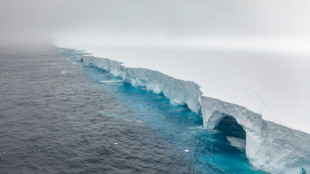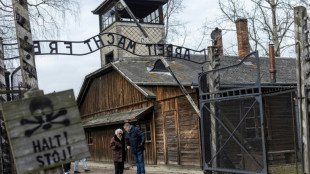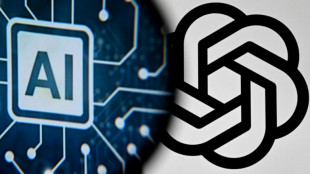
-
 Chiuri delves into past for what could be last Dior fashion show
Chiuri delves into past for what could be last Dior fashion show
-
Chinese property giant Vanke warns of huge loss, CEO resigns

-
 Taiwan identifies 52 'suspicious' Chinese ships for close monitoring
Taiwan identifies 52 'suspicious' Chinese ships for close monitoring
-
Chinese lion dance troupe shrugs off patriarchal past

-
 Asian stocks drop as tariff fears return, new AI programme emerges
Asian stocks drop as tariff fears return, new AI programme emerges
-
Troubled European carmakers to talk fines and EVs with EU

-
 Japan's Fuji TV faces heat over sex allegations
Japan's Fuji TV faces heat over sex allegations
-
Japan's Osaka bans street smoking ahead of Expo 2025

-
 ECB to cut rates again, with a nervous eye on Trump
ECB to cut rates again, with a nervous eye on Trump
-
Universal, Spotify ink multi-year deal

-
 Undersea cable between Sweden and Latvia damaged, both countries say
Undersea cable between Sweden and Latvia damaged, both countries say
-
'Neo-Dandies' and Trump fears at Paris Men's Fashion Week

-
 Belarusians near Ukraine border long for end to war
Belarusians near Ukraine border long for end to war
-
US Fed prepares to pause in first rate decision since Trump's inauguration

-
 Survivors centre stage for 80th anniversary of Auschwitz liberation
Survivors centre stage for 80th anniversary of Auschwitz liberation
-
Rubbish roads: Nepal explores paving with plastic

-
 US stocks retreat while yen gains on Bank of Japan rate hike
US stocks retreat while yen gains on Bank of Japan rate hike
-
Serbians strike in protest over fatal roof collapse

-
 Meta plans to invest $60 bn or more in AI this year
Meta plans to invest $60 bn or more in AI this year
-
Power cuts and transport chaos as Storm Eowyn hits Ireland and UK

-
 Croatians boycott shopping to protest high prices
Croatians boycott shopping to protest high prices
-
US home sales in 2024 weakest in nearly 30 years

-
 'White wall' of ice drifts toward remote penguin haven
'White wall' of ice drifts toward remote penguin haven
-
Stocks diverge as investors weigh earnings, Trump policies

-
 Beached whales: Airbus grounds its massive Beluga cargo flights
Beached whales: Airbus grounds its massive Beluga cargo flights
-
IMF chief tells Europe to take page out of US book

-
 Bob Dylan a contrast to 'narcissistic' modern stars, says biopic director
Bob Dylan a contrast to 'narcissistic' modern stars, says biopic director
-
Saudis showcase charm offensive in Davos

-
 Maltese businessman accused in journalist's murder granted bail
Maltese businessman accused in journalist's murder granted bail
-
Kazakhstan delays release of Azerbaijan plane black box data

-
 France asks EU to delay rights, environment business rules
France asks EU to delay rights, environment business rules
-
Troubled Burberry shows sign of recovery despite sales drop

-
 Italy's Monte dei Paschi bids 13.3 bn euros for Mediobanca
Italy's Monte dei Paschi bids 13.3 bn euros for Mediobanca
-
How the Taliban restrict women's lives in Afghanistan

-
 Bank of Japan hikes interest rate to 17-year high, boosts yen
Bank of Japan hikes interest rate to 17-year high, boosts yen
-
Catalonia eyes reversal of business exodus after big bank returns

-
 Tajikistan launches crackdown on 'witchcraft' and fortune-telling
Tajikistan launches crackdown on 'witchcraft' and fortune-telling
-
Bank of Japan hikes interest rate to 17-year high, signals more

-
 Asian markets build on Trump rally, yen climbs after BoJ cut
Asian markets build on Trump rally, yen climbs after BoJ cut
-
Survivors strive to ensure young do not forget Auschwitz

-
 Asian markets build on Trump rally, yen steady ahead of BoJ
Asian markets build on Trump rally, yen steady ahead of BoJ
-
OpenAI unveils 'Operator' agent that handles web tasks

-
 Bamboo farm gets chopping for US zoo's hungry new pandas
Bamboo farm gets chopping for US zoo's hungry new pandas
-
Fear in US border city as Trump launches immigration overhaul

-
 242 mn children's schooling disrupted by climate shocks in 2024: UNICEF
242 mn children's schooling disrupted by climate shocks in 2024: UNICEF
-
US Republicans pressure Democrats with 'born-alive' abortion bill

-
 Trump Davos address lifts S&P 500 to record, dents oil prices
Trump Davos address lifts S&P 500 to record, dents oil prices
-
Between laughs and 'disaster', Trump divides Davos

-
 Hundreds of people protest ahead of Swiss Davos meeting
Hundreds of people protest ahead of Swiss Davos meeting
-
US falling behind on wind power, think tank warns


Whistle blows in Germany for world's first hydrogen train fleet
Germany on Wednesday will inaugurate a railway line powered entirely by hydrogen, a "world first" and a major step forward for green train transport despite nagging supply challenges.
A fleet of 14 trains provided by French industrial giant Alstom to the German state Lower Saxony will replace the diesel locomotives on the 100 kilometres (60 miles) of track connecting the cities of Cuxhaven, Bremerhaven, Bremervoerde and Buxtehude near Hamburg.
"Whatever the time of day, passengers will travel on this route thanks to hydrogen", Stefan Schrank, project manager at Alstom, told AFP, hailing a "world first".
Hydrogen trains have become a promising way to decarbonise the rail sector and replace diesel, which still powers 20 percent of journeys in Germany.
Billed as a "zero emission" mode of transport, the trains mix hydrogen on board with oxygen present in the ambient air, thanks to a fuel cell installed in the roof. This produces the electricity needed to pull the train.
- Run for its money -
Designed in the southern French town of Tarbes and assembled in Salzgitter in central Germany, Alstom's trains -- called Coradia iLint -- are trailblazers in the sector.
The project drew investment of "several tens of millions of euros" and created jobs for up to 80 employees in the two countries, according to Alstom.
Commercial trials have been carried out since 2018 on the line with two hydrogen trains but now the entire fleet is adopting the ground-breaking technology.
The French group has inked four contracts for several dozen trains between Germany, France and Italy, with no sign of demand waning.
In Germany alone "between 2,500 and 3,000 diesel trains could be replaced by hydrogen models", Schrank estimates.
"By 2035, around 15 to 20 percent of the regional European market could run on hydrogen," Alexandre Charpentier, rail expert at consultancy Roland Berger, told AFP.
Hydrogen trains are particularly attractive on short regional lines where the cost of a transition to electric outstrips the profitability of the route.
Currently, around one out of two regional trains in Europe runs on diesel.
But Alstom's competitors are ready to give it a run for its money. German behemoth Siemens unveiled a prototype hydrogen train with national rail company Deutsche Bahn in May, with a view to a roll-out in 2024.
But, despite the attractive prospects, "there are real barriers" to a big expansion with hydrogen, Charpentier said.
For starters, trains are not the only means of transport hungry for the fuel.
The entire sector, whether it be road vehicles or aircraft, not to mention heavy industry such as steel and chemicals, are eyeing hydrogen to slash CO2 emissions.
- Colossal investment -
Although Germany announced in 2020 an ambitious seven-billion-euro (-dollar) plan to become a leader in hydrogen technologies within a decade, the infrastructure is still lacking in Europe's top economy.
It is a problem seen across the continent, where colossal investment would be needed for a real shift to hydrogen.
"For this reason, we do not foresee a 100-percent replacement of diesel trains with hydrogen," Charpentier said.
Furthermore, hydrogen is not necessarily carbon-free: only "green hydrogen", produced using renewable energy, is considered sustainable by experts.
Other, more common manufacturing methods exist, but they emit greenhouse gases because they are made from fossil fuels.
The Lower Saxony line will in the beginning have to use a hydrogen by-product of certain industries such as the chemical sector.
The French research institute IFP specialising in energy issues says that hydrogen is currently "95 percent derived from the transformation of fossil fuels, almost half of which come from natural gas".
Europe's enduring reliance on gas from Russia amid massive tensions over the Kremlin's invasion of Ukraine poses major challenges for the development of hydrogen in rail transport.
"Political leaders will have to decide which sector to prioritise when determining what the production of hydrogen will or won't go to," Charpentier said.
Germany will also have to import massively to meet its needs.
Partnerships have recently been signed with India and Morocco, and an agreement to import hydrogen from Canada was on the agenda this week during a visit by Chancellor Olaf Scholz.
S.F.Lacroix--CPN
